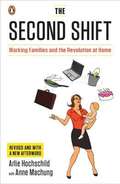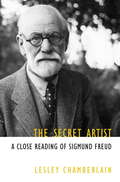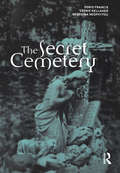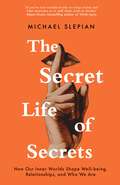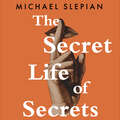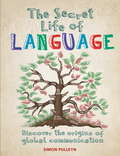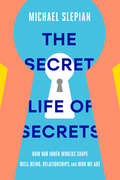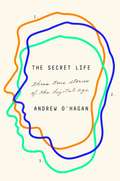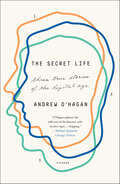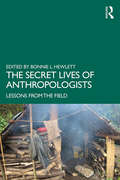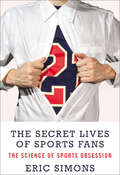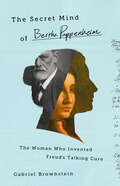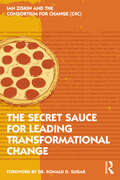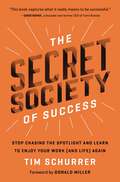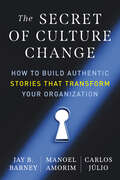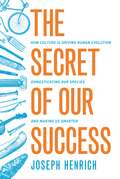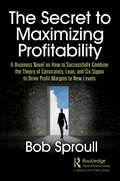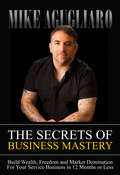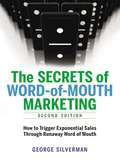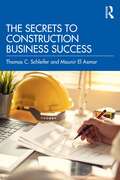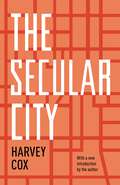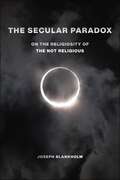- Table View
- List View
The Second Shift: Working Families and the Revolution at Home
by Anne Machung Arlie HochschildAn updated edition of a standard in its field that remains relevant more than twenty years after its original publication. More than twenty years ago, sociologist and University of California, Berkeley, professor Arlie Hochschild set off a tidal wave of conversation and controversy with his bestselling book, The Second Shift In it, she examined what really happens in dual-career households. Adding together time in paid work, child care, and housework, she found that working mothers put in a month of work a year more than their spouses. Updated for a workforce now half female, this edition cites a range of new studies and statistics and includes a new afterword in which Hochschild assesses how much-and how little-has changed for women today. .
The Secret Artist
by Lesley ChamberlainWidely acclaimed for giving "an understanding of the connection between Nietzsche's personal experience and his most famous ideas" (Christopher Lehmann-Haupt, New York Times) in her biography of Nietzsche, Nietzsche in Turin, Chamberlain now renders a similar service to readers of Freud. In this book, part biography, part literary criticism, she takes the reader into the mind of Freud, toward a better understanding of the thinker, his work, and art itself. The very idea of the subconcious as a constant, active presence in our daily lives was Freud's greatest contribution and has allowed generations of people to experience their lives more deeply. His rigorous exploration of the dynamism and structures of the subconscious, Chamberlain argues, was in itself an important work of art. Using Freud's own writing on art and the aesthetic theories of thinkers ranging from Nietzsche to Lionel Trilling, Chamberlain examines Freud's art and shows how his imaginative creations have revolutionized not only mental health, but our thinking about art in general, by opening up the individual subconscious as a subject. In elegant, accessible prose she describes how "Freud split the aesthetic atom, releasing a vast energy for individual creativity."
The Secret Cemetery
by Leonie Kellaher Doris Francis Georgina NeophytouBurial sites have long been recognized as a way to understand past civilizations. Yet, the meanings of our present day cemeteries have been virtually ignored, even though they reveal much about our cultures. Exploring an extraordinarily diverse range of memorial practice - Greek Orthodox, Muslim, Jewish, Roman Catholic and Anglican, as well as the unchurched - The Secret Cemetery is an intriguing study of what these places of death mean to the living. Most of us experience cemeteries at a ritualized moment of loss. What we forget is that these are often places to which we return either as a general space in which to contemplate or as a specific site to be tended. These are also places where different communities can reinforce boundaries and even recreate a sense of homeland. Over time, ritual, artefact and place shape an intensely personal landscape of memory and mourning, a landscape more alive, more actively engaged with than many of the other places we inhabit.
The Secret Kingdom
by Pat Robertson Bob SlosserThe author of New York Times bestseller The New World Order confronts the tougest issues of the '90s by setting forth ten principles to help obtain peace, love, and financial security. A classic work, now revised, this book has sold in excess of 500,000 copies.
The Secret Life Of Secrets: How Our Inner Worlds Shape Well-being, Relationships, and Who We Are
by Michael SlepianAn eye-opening look at why we keep the secrets we keep, how to better understand and cope with them, and when (and how) we should bring them to light.Think of a secret that you're keeping from others. It shouldn't take long. Psychologist Michael Slepian finds that, on average, we are keeping as many as thirteen secrets at any given time. His research, involving more than 50,000 participants from around the world, shows that we most frequently keep secrets about lies we've told, ambitions, addictions, mental health challenges, hidden relationships and financial struggles.Our secrets can weigh heavily upon us. Yet the burden of secrecy rarely stems from the work it takes to keep a secret hidden. Rather, the weight of our secrets comes from carrying them alone. Whether we are motivated to protect our reputation, a relationship, a loved one's feelings, or some personal or professional goal, one thing is clear: holding back some part of our inner world is often lonely and isolating. But it doesn't have to be. Filled with fresh insight into one of the most universal - yet least understood - aspects of human behaviour, The Secret Life of Secrets sheds fascinating new light on questions like: At what age do children develop the cognitive capacity for secrecy? Do all secrets come with the same mental load? How can we reconcile our secrets with our human desires to relate, connect and be known? When should we confess and to whom? And can keeping certain types of secrets actually enhance our well-being? Drawing on over a decade of original research, this book reveals the surprising ways in which secrets pervade our lives, and offers science-based strategies that make them easier to live with. The result is a rare window into the inner workings of our minds, our relationships and our sense of who we are.
The Secret Life Of Secrets: How Our Inner Worlds Shape Well-being, Relationships, and Who We Are
by Michael Slepian'If you've ever wondered why we keep secrets and what motivates us to spill them, look no further' Adam Grant, #1 New York Times bestselling author of Think AgainAn eye-opening look at why we keep the secrets we keep, how to better understand and cope with them, and when (and how) we should bring them to light.Think of a secret that you're keeping from others. It shouldn't take long. Psychologist Michael Slepian finds that, on average, we are keeping as many as thirteen secrets at any given time. His research, involving more than 50,000 participants from around the world, shows that we most frequently keep secrets about lies we've told, ambitions, addictions, mental health challenges, hidden relationships and financial struggles.Our secrets can weigh heavily upon us. Yet the burden of secrecy rarely stems from the work it takes to keep a secret hidden. Rather, the weight of our secrets comes from carrying them alone. Whether we are motivated to protect our reputation, a relationship, a loved one's feelings, or some personal or professional goal, one thing is clear: holding back some part of our inner world is often lonely and isolating. But it doesn't have to be. Filled with fresh insight into one of the most universal - yet least understood - aspects of human behaviour, The Secret Life of Secrets sheds fascinating new light on questions like: At what age do children develop the cognitive capacity for secrecy? Do all secrets come with the same mental load? How can we reconcile our secrets with our human desires to relate, connect and be known? When should we confess and to whom? And can keeping certain types of secrets actually enhance our well-being? Drawing on over a decade of original research, this book reveals the surprising ways in which secrets pervade our lives, and offers science-based strategies that make them easier to live with. The result is a rare window into the inner workings of our minds, our relationships and our sense of who we are.
The Secret Life of Cowboys
by Tom Groneberg"One of the stories I tell myself when I am trying to fall asleep is that I have tried. I've tagged along after myself in the pages of my own modern Western, and every few years is another chapter to the story. The myth of the cowboy. I chased a dream and it kicked me in the teeth. Yet I find myself falling for it again and again."Across the rugged and beautiful landscape of the contemporary American West, Tom Groneberg paints an unsparing portrait of his flawed, funny, and sometimes triumphant efforts to become a cowboy. It is a classic tale: a young man, facing a future he doesn't want to claim, has an inspiration -- Go West.Leaving behind his friends and family, Groneberg follows his heart and heads to a resort town in the Colorado Rockies, where he earns his spurs as a wrangler leading tourists on horseback. Like an old saddle blanket, the tale unfolds, revealing the clean threads of a new story. Groneberg moves to Montana, working for wages at a number of ranches before getting a chance to become the owner of a sprawling ranch, fifteen square miles of grass and sky.In lean but passionate prose, Groneberg demystifies the image of cowboy as celluloid hero and introduces us to the tough and kindhearted men who teach him how to be a real cowboy, the woman who teaches him how to love, and their son, who teaches him how to be a man. The Secret Life of Cowboys is both a coming-of-age story as stunning as the land itself and a revealing look at America's last frontier.
The Secret Life of Language (Secret Life of)
by Simon PulleynThis book looks at how language has evolved around the globe from ancestral proto-languages to our recognisable modern tongues. It demonstrates how language has been shaped by social and cultural influences, and even explains how our anatomy affects the articulation, and therefore evolution, of words. Discover the surprising stories behind theorigin of the written word, the difficulties of decipherment and the challenge of inventing from scratch languages such as Dothraki.Combining expert analysis with accessible narrative and fun illustrations, The Secret Life of Language makes even the complex topics of philology, morphology and phonology easy to understand.
The Secret Life of Language: Discover The Origins Of Global Communication (The\secret Life Of Ser.)
by Simon PulleynThis book looks at how language has evolved around the globe from ancestral proto-languages to our recognisable modern tongues. It demonstrates how language has been shaped by social and cultural influences, and even explains how our anatomy affects the articulation, and therefore evolution, of words. Discover the surprising stories behind theorigin of the written word, the difficulties of decipherment and the challenge of inventing from scratch languages such as Dothraki.Combining expert analysis with accessible narrative and fun illustrations, The Secret Life of Language makes even the complex topics of philology, morphology and phonology easy to understand.
The Secret Life of Secrets: How Our Inner Worlds Shape Well-Being, Relationships, and Who We Are
by Michael Slepian&“If you&’ve ever wondered why we keep secrets and what motivates us to spill them, look no further. Michael Slepian has spent the past decade studying the psychology of secrets, and is ready to reveal his findings to the world.&”—Adam Grant, #1 New York Times bestselling author of Think Again Think of a secret that you&’re keeping from others. It shouldn&’t take long; behavioral scientist Michael Slepian finds that, on average, we are keeping as many as thirteen secrets at any given time. His research involving more than 50,000 participants from around the world shows that the most common secrets include lies we&’ve told, ambitions, addictions, mental health challenges, hidden relationships, and financial struggles.Our secrets can weigh heavily upon us. Yet the burden of secrecy, Slepian argues, rarely stems from the work it takes to keep a secret hidden. Rather, the weight of our secrets comes from carrying them alone, without the support of others. Whether we are motivated to protect our reputation, a relationship, a loved one&’s feelings, or some personal or professional goal, one thing is clear: Holding back some part of our inner world is often lonely and isolating. But it doesn&’t have to be.Filled with fresh insight into one of the most universal—yet least understood—aspects of human behavior, The Secret Life of Secrets sheds a fascinating new light on questions like: At what age do children develop the cognitive capacity for secrecy? Do all secrets come with the same mental load? How can we reconcile our secrets with our human desires to relate, connect, and be known? When should we confess our secrets? Who makes for the ideal confidant? And can keeping certain types of secrets actually enhance our well-being?Drawing on over a decade of original research, Slepian reveals the surprising ways that secrets pervade our lives, and offers science-based strategies that make them easier to live with. The result is a rare window into the inner workings of our minds, our relationships, and our sense of who we are.
The Secret Life: Three True Stories of the Digital Age
by Andrew O'HaganFrom the award-winning author of The Illuminations, a significant and timely work of non-fiction by one of the most important writers of his generation.Julian Assange, a man who, five years ago, seemed to herald a new, enlightened form of democracy -- until, that is, the apparent heroism of WikiLeaks became compromised by his hubris and paranoia. Satoshi Nakamoto, another man who radically reshaped the business of information and secrecy on a global scale. He is known as the elusive inventor of Bitcoin, but who is the real Satoshi -- a lone wolf or a collective of individuals with the talent to reimagine the financial wheel? And Ronald Pinn, a man who does not exist at all, except in the furthest, darkest reaches of O'Hagan's internet use. Driven by an interest in the ease with which it is possible to create an identity in an online world, O'Hagan journeys into the dark web where everything -- sex, drugs, guns -- is for sale.The Secret Life is about these elusive individuals, written in three individual yet deeply connected essays. It is a dazzling book about the porousness between genius and madness, between fact and fiction. It is about nothing less than modern personality in the digital age.
The Secret Life: Three True Stories of the Digital Age
by Andrew O'HaganAward-winning essayist and novelist Andrew O’Hagan presents a trio of reports exploring the idea of identity on the Internet—true, false, and in between—where your virtual self takes on a life of its own outside of reality.A Publishers Weekly Best Book of the Year • One of Publishers Weekly's Top 10 Book of Essays and Literary Criticism • One of Chicago Reader's Books We Can’t Wait to ReadThe Secret Life issues three bulletins from the porous border between cyberspace and IRL.“Ghosting” introduces us to the beguiling and divisive Wikileaks founder Julian Assange, whose autobiography O’Hagan agrees to ghostwrite with unforeseen—and unforgettable—consequences. “The Invention of Ronnie Pinn” finds him using the actual identity of a deceased young man to construct an entirely new one in cyberspace, leading him on a journey deep into the Web’s darkest realms. And “The Satoshi Affair” chronicles the strange case of Craig Wright, the Australian Web developer who may or may not be the mysterious inventor of Bitcoin, Satoshi Nakamoto—and who may or may not be willing, or even able, to reveal the truth.These fascinating pieces take us to the weirder fringes of life in a digital world while also casting light on our shared predicaments. What does it mean when your very sense of self becomes, to borrow a term from the tech world, “disrupted”? The Secret Life shows us that it might take a novelist, an inventor of selves, armed with the tools of a trenchant reporter, to find an answer.
The Secret Lives of Anthropologists: Lessons from the Field
by Bonnie HewlettThis book addresses the difficult conditions researchers may face in the field and provides lessons in how to navigate the various social, political, economic, health, and environmental challenges involved in fieldwork. It also sheds important light on aspects often considered "secret" or taboo. From anthropologists just starting out to those with over forty years in the field, these researchers offer the benefit of their experience conducting research in diverse cultures around the world. The contributions combine engaging personal narrative with consideration of theory and methods. The volume emphasizes how being adaptable, and aware, of the many risks and rewards of ethnographic research can help foster success in quantitative and qualitative data collection. This is a valuable resource for students of anthropological methods and those about to embark on fieldwork for the first time.
The Secret Lives of Sports Fans: The Science of Sports Obsession
by Eric SimonsSports fandom is either an aspect of a person's fundamental identity, or completely incomprehensible to those who aren't fans at all. What is happening in our brains and bodies when we feel strong emotion while watching a game? How do sports fans resemble political junkies, and why do we form such a strong attachment to a sports team? Journalist Eric Simons presents in-depth research in an accessible and brilliant way, sure to interest readers of Jonah Lehrer and Malcolm Gladwell. Through reading the literature and attending neuroscience conferences, talking to fans, psychologists, and scientists, and working through his issues as part of a collaboration with the NPR science program RadioLab, Eric Simons hoped to find an answer that would explain why the attractive force of this relationship with treasured sports teams is so great that we can't leave it.
The Secret Mind of Bertha Pappenheim: The Woman Who Invented Freud's Talking Cure
by Gabriel BrownsteinThe story of a patient who changed the world, and the mystery of her illness. In 1880, young Bertha Pappenheim got strangely ill—she lost her ability to control her voice and her body. She was treated by Sigmund Freud&’s mentor, Josef Breuer, who diagnosed her with &“hysteria.&” Together, Pappenheim and Breuer developed what she called &“the talking cure&”—talking out memories to eliminate symptoms. Freud renamed her &“Anna O&” and appropriated her ideas to form the theory of psychoanalysis. All his life, he told lies about her. For over a century, writers have argued about her illness and cure. In this unusual work of science, history, and psychology, Brownstein does more than describe the controversies surrounding this extraordinary woman. He brings Pappenheim to life—a brilliant feminist thinker, a crusader against human trafficking, and a pioneer—in the hustling and heady world of nineteenth-century Vienna. At the same time, he tells a parallel story that is playing out in leading medical centers today, about patients who suffer symptoms very much like Pappenheim&’s, and about the doctors who are trying to cure them—the story of the neuroscience of a condition now called FND.The Secret Mind of Bertha Pappenheim argues for the healing art of listening and describes the new &“talking cures&” emerging out of neuroscience today.
The Secret Sauce for Leading Transformational Change
by Ian ZiskinWritten by a collaborative, diverse, and inclusive community of contributors and business experts, this book is about leading transformational change on an individual, team, organizational, and societal level. Most large-scale transformational change happens because of unanticipated, unaddressed, unplanned disruptions which raise questions about what it takes to lead, survive, and even thrive in periods of transformational change. This book answers these critical questions: What do leaders who drive and sustain successful transformational change actually do? Why do we so often fail to lead and sustain transformational change? All transformation is change, but is all change transformational? This first-of-its-kind book offers a variety of lenses and perspectives, in the form of interviews, essays, and survey responses, with insights from business leaders, HR leaders, coaches, consultants, academics, thought leaders, and other transformational change experts. The compilation of practical tools provides readers with a deep and diverse analysis of top-notch thinking and practices for leading transformational change. This work is fundamental to aspiring leaders, professionals, and academics who wish to learn the secret sauce for leading transformational change.
The Secret Society of Success: Stop Chasing the Spotlight and Learn to Enjoy Your Work (and Life) Again
by Tim SchurrerIt&’s time to redefine success.&“The book you&’re about to read is an absolute game changer, life changer, and outlook changer. . . . You will never view success the same way again. And that&’s a very good thing.&”— ERNIE JOHNSON JR., Emmy Award winner and host of TNT&’s Inside the NBAThere&’s a message getting a lot of airtime these days. It says to be successful, you have to step into the spotlight, climb the ladder, become the boss, or chase whatever version of success that&’s been dangled in front of you.But what if there&’s another way? What if fame, money, and power aren&’t all that we should be chasing?In The Secret Society of Success, Tim Schurrer invites you to reevaluate your definition of success and learn a new, freer way to go about achieving it. How do you learn this approach? With the Secret Society as your guide—a community of people who know how to make an impact, whether they have the spotlight or not. The Secret Society will teach you todefine success for yourself;contribute to your team without minding who gets the credit;make an impact that spans far beyond yourself, regardless of the size of your platform;navigate living in the tension between contentment and striving;go from feeling anxious, overwhelmed, and restless in your job to being confident in the value you bring to the team; anddiscover meaning and fulfillment in the work that you do. Through powerful stories of people like the CEO of Apple Tim Cook, NBA all-star LeBron James, Fred Rogers of Mister Rogers&’ Neighborhood, and people whose names you&’ve never heard of, you will discover that the success you&’re looking for is within your reach, wherever you are and whatever your role.&“The Secret Society of Success is an important book that everyone should read. It is not only insightful; it&’s inspirational. This book captures what it really means to be successful. I am for one ready to up my game! Thank you, Tim, for giving me this gift!&”— DAVID NOVAK, cofounder and former chairman and CEO of Yum! Brands (KFC, Taco Bell, Pizza Hut)
The Secret of Culture Change: How to Build Authentic Stories That Transform Your Organization
by Jay B. Barney Manoel Amorim Carlos JúlioFind out how bold actions by visionary leaders can inspire powerful stories that drive culture change.Data indicates that most strategic efforts to change a company's culture fail. So how do companies succeed in this endeavor? A top strategy professor and two highly successful CEOs found that, in companies that had successfully changed their culture, leaders had taken dramatic actions that embodied the new cultural values. These actions inspired stories that became company legends, repeated in every department and handed on to new employees. Through compiling and analyzing 150 stories from business leaders who have achieved change, they identified 6 attributes that every successful culture change story has in common:1. The actions are authentic2. They revolve around the CEO3. They signal a clean break with the past, and a clear path to the future4. They appeal to employee heads and hearts5. They're often theatrical or dramatic6. They're told, and re-told, throughout the organizationWith extensive and inspiring examples of stories containing these attributes, the authors illustrate how readers can harness the power of stories within their company in order to change or create a winning culture to align with any strategy.
The Secret of Our Success: How Culture Is Driving Human Evolution, Domesticating Our Species, and Making Us Smarter
by Joseph HenrichHumans are a puzzling species. On the one hand, we struggle to survive on our own in the wild, often failing to overcome even basic challenges, like obtaining food, building shelters, or avoiding predators. On the other hand, human groups have produced ingenious technologies, sophisticated languages, and complex institutions that have permitted us to successfully expand into a vast range of diverse environments. What has enabled us to dominate the globe, more than any other species, while remaining virtually helpless as lone individuals? This book shows that the secret of our success lies not in our innate intelligence, but in our collective brains--on the ability of human groups to socially interconnect and learn from one another over generations. Drawing insights from lost European explorers, clever chimpanzees, mobile hunter-gatherers, neuroscientific findings, ancient bones, and the human genome, Joseph Henrich demonstrates how our collective brains have propelled our species' genetic evolution and shaped our biology. Our early capacities for learning from others produced many cultural innovations, such as fire, cooking, water containers, plant knowledge, and projectile weapons, which in turn drove the expansion of our brains and altered our physiology, anatomy, and psychology in crucial ways. Later on, some collective brains generated and recombined powerful concepts, such as the lever, wheel, screw, and writing, while also creating the institutions that continue to alter our motivations and perceptions. Henrich shows how our genetics and biology are inextricably interwoven with cultural evolution, and how culture-gene interactions launched our species on an extraordinary evolutionary trajectory. Tracking clues from our ancient past to the present, The Secret of Our Success explores how the evolution of both our cultural and social natures produce a collective intelligence that explains both our species' immense success and the origins of human uniqueness.
The Secret to Maximizing Profitability: A Business Novel on How to Successfully Combine The Theory of Constraints, Lean, and Six Sigma to Drive Profit Margins to New Levels
by Bob SproullThis book fully details, as the title suggests, the real secret to maximizing an organization's profitability. While many companies have implemented improvement initiatives such as Six Sigma and Lean Manufacturing, there is a missing link which, when discovered and implemented, will take these same companies to profit levels not seen before. This missing link is the Theory of Constraints, and when it’s combined with Lean and Six Sigma, true transformational improvements are sure to follow. In this book, the author walks you through the step-by-step method on how to combine these three methodologies with the result being significant improvements to flow, major improvements in variation, substantial reductions in waste, superior on-time delivery, and ultimately, maximized profitability. He has been using this integrated methodology for many years and each time, the results realized were well beyond what the leadership teams had experienced previously. The genesis behind this combined improvement cycle is based upon many years of analysis of both failures and successes using Lean, Six Sigma, and the Theory of Constraints as stand-alone improvement initiatives. By integrating Lean, Six Sigma and the Theory of Constraints into a single improvement cycle, the author has developed a recipe that will maximize your return on investment, cash flow, and net profit. The Secret to Maximizing Profitability is both stimulating and thought provoking, but more importantly it will provide your organization with a roadmap for maximizing the use of your resources to achieve more bottom-line improvement than you ever imagined possible.
The Secrets of Business Mastery: Build Wealth, Freedom and Market Domination For Your Service Business in 12 Months or Less
by Mike AgugliaroService business owners often start their businesses with little or no business knowledge, but simply a desire to excel in their trade and be their own boss. Unfortunately, they quickly learn that it takes a lot of skill, knowledge, and hard work to run their business – no wonder so many burn out! In Secrets Of Business Mastery, Mike Agugliaro reveals his best secrets to starting and growing a service business. He shows how readers can master themselves, their time, team, marketing, finances, future, and more – all to build a high-performing business.
The Secrets of Word-of-Mouth Marketing: How to Trigger Exponential Sales Through Runaway Word of Mouth
by George Silverman"In our hype-infested society, honest and positive word of mouth can multiply sales explosively. But for those who think it happens by chance (as most marketers do), this book will be an eye-opener. The surprising truth is that word of mouth can be implemented as strategically as any other form of marketing--and at significantly lower cost! This is especially good news for any seller of products or services who must maximize every marketing dollar. Central to this book is the innovative Decision Matrix, which helps readers identify who their potential buyers are and what messages those prospects need to hear from friends, coworkers, and trusted advisors. This matrix is followed by step-by-step guidance on how to construct an integrated ""no vested interest"" campaign that leverages all channels (including traditional media, the Internet, and PR), penetrates successive tiers of audiences, and builds sales exponentially. Marketers will learn how to: * Target the predominate adopter type (innovator, early, middle, late, laggard) * Create the content--the actual words--needed to accelerate the process * Identify the sources and delivery mechanisms that will be most persuasive * Use the wide variety of methods that trigger runaway word of mouth. "
The Secrets to Construction Business Success
by Thomas C. Schleifer Mounir El AsmarWith a daunting industry-wide business failure rate, construction professionals need to manage risk and finances as effectively as they manage projects and people. The Secrets to Construction Business Success empowers contractors and other professionals to defy the long odds threatening their stability, growth, and very survival. Drawing on the authors’ more than eight decades of combined experience turning around failing firms, this book provides a masterclass in structuring, managing, and futureproofing a construction business. Chapters on measuring and responding to dips in revenue equip executives to recognize and respond to the warning signs of financial distress while chapters on succession planning ensure that organizations survive their founders’ departures. Sample documents and tools developed for the authors’ consulting practice offer field-tested solutions to organizational structure, forecasting, and accounting challenges. A steady source of guidance in an industry with few constants, The Secrets to Construction Business Success makes an invaluable addition to any industry leader’s library.
The Secular City: Secularization and Urbanization in Theological Perspective
by Harvey CoxSince its initial publication in 1965, The Secular City has been hailed as a classic for its nuanced exploration of the relationships among the rise of urban civilization, the decline of hierarchical, institutional religion, and the place of the secular within society. Now, half a century later, this international best seller remains as relevant as when it first appeared. The book's arguments--that secularity has a positive effect on institutions, that the city can be a space where people of all faiths fulfill their potential, and that God is present in both the secular and formal religious realms--still resonate with readers of all backgrounds. For this brand-new edition, Harvey Cox provides a substantial and updated introduction. He reflects on the book's initial stunning success in an age of political and religious upheaval and makes the case for its enduring relevance at a time when the debates that The Secular City helped ignite have caught fire once again.
The Secular Paradox: On the Religiosity of the Not Religious (Secular Studies #5)
by Joseph BlankholmChoice Outstanding Academic Title 2023A radically new way of understanding secularism which explains why being secular can seem so strangely religiousFor much of America’s rapidly growing secular population, religion is an inescapable source of skepticism and discomfort. It shows up in politics and in holidays, but also in common events like weddings and funerals. In The Secular Paradox, Joseph Blankholm argues that, despite their desire to avoid religion, nonbelievers often seem religious because Christianity influences the culture around them so deeply. Relying on several years of ethnographic research among secular activists and organized nonbelievers in the United States, the volume explores how very secular people are ambivalent toward belief, community, ritual, conversion, and tradition. As they try to embrace what they share, secular people encounter, again and again, that they are becoming too religious. And as they reject religion, they feel they have lost too much. Trying to strike the right balance, secular people alternate between the two sides of their ambiguous condition: absolutely not religious and part of a religion-like secular tradition.Blankholm relies heavily on the voices of women and people of color to understand what it means to live with the secular paradox. The struggles of secular misfits—the people who mis-fit normative secularism in the United States—show that becoming secular means rejecting parts of life that resemble Christianity and embracing a European tradition that emphasizes reason and avoids emotion. Women, people of color, and secular people who have left non-Christian religions work against the limits and contradictions of secularism to create new ways of being secular that are transforming the American religious landscape. They are pioneering the most interesting and important forms of secular “religiosity” in America today.
